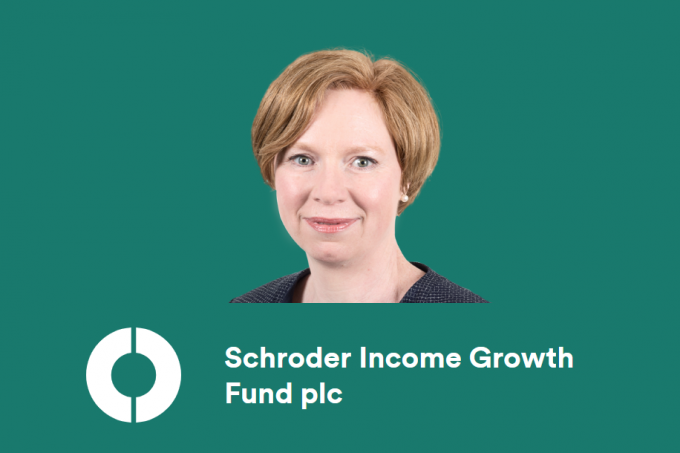Over the 12 months to the end of August 2022, Schroder Income Growth lagged the All-Share Index, delivering a return on NAV of -2.7% and a return to shareholders of -4.7% against a +1.0% return for the benchmark index. The dividend was increased to 13.2p, up 3.1% on the previous year and this was covered by earnings of 13.96p.
The discount to NAV averaged 1.1% during the year and ended the year at 2.1%. The company was not able to issue any shares during the period and did not buy back any either.
Extracts from the manager’s report
On income
For the second consecutive year, large payments made by mining holdings BHP Billiton, Rio Tinto and Anglo American were the most significant contributors to portfolio income over the period. Special dividends were again a feature from Rio Tinto and Anglo American but at reduced levels compared to the prior period. Income from Shell increased more than threefold as we built our position over the period, together with a significant 44% increase in dividend payments compared to the prior year when the company cut payments significantly. A diverse range of holdings saw dividend growth in excess of 20%. This included companies where the passing of the pandemic had reopened operations (property businesses student accommodation provider Unite and SME business unit provider Workspace) or enabled management to reduce their cautious approach to payments (construction and infrastructure group Balfour Beatty). Meanwhile, a number of portfolio holdings resumed strong dividends having previously cut them, such as oil and gas giant Shell, Asian life insurance company Prudential and interdealer broker TP ICAP. Other holdings which had significant dividend increases from growth in their businesses included private capital investors 3i, private equity investment firm Intermediate Capital Group, international employment recruiter SThree, pet care business Pets at Home, diversified miner BHP Billiton and payments provider Paypoint. A number of other holdings increased dividend payments by 10% or more, including luxury fashion house Burberry, food retailer Tesco, biopharma company AstraZeneca, speciality chemical business Johnson Matthey, diversified miner Anglo American and power generator Drax. A small number of holdings saw dividend payments fall. These included Bunzl, where the comparison of 2021 was inflated by a catch-up dividend payment from the prior year, GSK, which rebased its dividend payment down after the demerger of Haleon, and Unilever, where the dividend in sterling fell due to Euro weakness against sterling earlier in the period. The remainder of the Company’s holdings posted income gains in the range up to 10%.
On performance
The NAV per share total return underperformed the FTSE All-Share Index total return over the period, with sector allocation the main driver of negative relative returns.
One of the main drivers of underperformance over the period was being underexposed, relative to the index, to the strongly performing oil and banking sectors. The strength of the economic recovery from the Covid-induced recession initially boosted demand for oil and gas producers, while the Russia Ukraine conflict exacerbated prices further. Not owning oil company BP, which strongly outperformed, was detrimental. Bond yields rose as expectations for interest rate rises increased, supporting banks. Subsequently, not owning large Asian-focused bank HSBC notably weighed on relative performance, albeit that our position in another Asian bank, Standard Chartered, which also performed strongly, partly mitigated this. Not holding tobacco stocks, such as British American Tobacco, whose defensive characteristics were rewarded, also weighed on performance.
Other notable detractors included our large holding in Pets at Home, one of the portfolio’s top performers over the prior financial year, which suffered from a derating in its shares despite continued, strong operational delivery. Concern that the stock was a “Covid winner”, which would struggle to sustain growth levels, was exacerbated by the announcement of senior management changes. We remain optimistic about the company’s longer term prospects given the strong track record of growth in its retail business and significant opportunity for its vets practice division. Household spending on pets has also shown resilience in prior recessions which adds to our confidence in the holding given the current squeeze on household incomes.
Our decision to invest in betting and gaming group company 888 has proved costly over the past year. Share price weakness has been acute as the market has focused on the extent and cost of the debt associated with the group’s acquisition of William Hill’s UK assets. We believe the deal has strategic merit as it diversifies the business by geography and product, with scope for cost savings and the potential for revenue synergies as cross-selling opportunities exist between gaming (888) and sports (William Hill).
On the positive side, our position in power generation company Drax performed strongly. Drax has switched its focus from coal to biomass renewable fuels and has longer-term attractions of the potential to deploy carbon capture and storage technology to become a leading carbon negative energy business.
Our longstanding position in education content provider Pearson contributed to performance as, under the new CEO, strategy was better articulated and executed. Meanwhile, defence services business QinetiQ experienced share price volatility during the 12-month period. The shares fell sharply in the autumn of 2021, due to disclosure of an uncharacteristic problem contract that emanated from supply chain issues. Following engagement with the company, we believed that the negative sentiment and share price reaction was overdone and we added to our position. The subsequent share price recovery on a larger holding generated a positive impact. Lastly, not holding closed-ended investment vehicles, such as Scottish Mortgage Investment Trust, was also a positive.
SCF : Schroder Income Growth misses out on oil and banks rally
